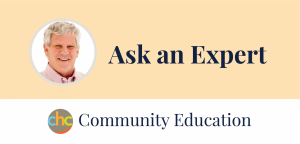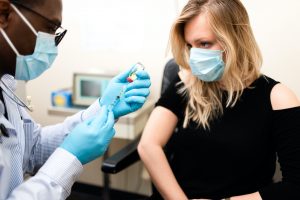Stress & Resilience During COVID
 COVID has altered almost every aspect of our lives, and the effects of this cumulative and prolonged stress response can affect our brain size, structure and functioning.
COVID has altered almost every aspect of our lives, and the effects of this cumulative and prolonged stress response can affect our brain size, structure and functioning.
We sat down with Clinical Program Manager and Licensed Psychologist at CHC, Patrice Crisostomo, PhD, to learn about the very individualized ways that stress can manifest itself in kids and adults, and effective vs. ineffective coping strategies. Read more ›

 The work of young children is to build language and social skills, much of which happen through family relationships, play and social interaction with peers. With kids spending so much more time at home and online, it’s important to create lots of opportunities for our young children to practice these skills in other ways.
The work of young children is to build language and social skills, much of which happen through family relationships, play and social interaction with peers. With kids spending so much more time at home and online, it’s important to create lots of opportunities for our young children to practice these skills in other ways. 
 As kids hit toddlerhood, making sure they’re on track with major development milestones such as talking can sometimes be difficult to judge.
As kids hit toddlerhood, making sure they’re on track with major development milestones such as talking can sometimes be difficult to judge. We are excited about the possibility of our kids returning to school, yet understandably concerned about what that re-entry looks like. In this live Ask an Expert session, we are having a conversation with Chris Harris MEd, Chief Schools Officer at CHC.
We are excited about the possibility of our kids returning to school, yet understandably concerned about what that re-entry looks like. In this live Ask an Expert session, we are having a conversation with Chris Harris MEd, Chief Schools Officer at CHC. 

 COVID has left us sheltered-in-place, second-guessing every decision, cut off from friends and family, with plans completely out of our control for nearly a year. We’re exhausted, anxious, depressed, lonely and exasperated. Our kids slump over their screens while teachers bend over backwards to keep them educated and engaged. Our weekend calendars stare back at us, blankly. But now there is hope. As vaccines make their way into the world, we can start to imagine a life beyond our 6-foot radius.
COVID has left us sheltered-in-place, second-guessing every decision, cut off from friends and family, with plans completely out of our control for nearly a year. We’re exhausted, anxious, depressed, lonely and exasperated. Our kids slump over their screens while teachers bend over backwards to keep them educated and engaged. Our weekend calendars stare back at us, blankly. But now there is hope. As vaccines make their way into the world, we can start to imagine a life beyond our 6-foot radius.  Let’s face it. Life can be painful. While we can’t avoid pain, our resistance to accept reality only exacerbates our suffering. In this podcast episode, we sat down with
Let’s face it. Life can be painful. While we can’t avoid pain, our resistance to accept reality only exacerbates our suffering. In this podcast episode, we sat down with  What does 2e look like, and how can you best leverage the strengths and interests of your 2e child during distance learning? In today’s episode, Resilience and Engagement for Every Learner (REEL) founders and parents of 2e kids, Callie Turk and Yael Valek, share the joys and silver linings of flexible learning for 2e students.
What does 2e look like, and how can you best leverage the strengths and interests of your 2e child during distance learning? In today’s episode, Resilience and Engagement for Every Learner (REEL) founders and parents of 2e kids, Callie Turk and Yael Valek, share the joys and silver linings of flexible learning for 2e students. 
 What’s not often well-known or well-understood is that students who are gifted may also have a special need or disability— just as students with disabilities may also be gifted. The term “twice-exceptional,” also referred to as “2e,” is used to describe gifted children who, have the characteristics of gifted students with the potential for high achievement and give evidence of one or more disabilities as defined by federal or state eligibility criteria.
What’s not often well-known or well-understood is that students who are gifted may also have a special need or disability— just as students with disabilities may also be gifted. The term “twice-exceptional,” also referred to as “2e,” is used to describe gifted children who, have the characteristics of gifted students with the potential for high achievement and give evidence of one or more disabilities as defined by federal or state eligibility criteria. 

